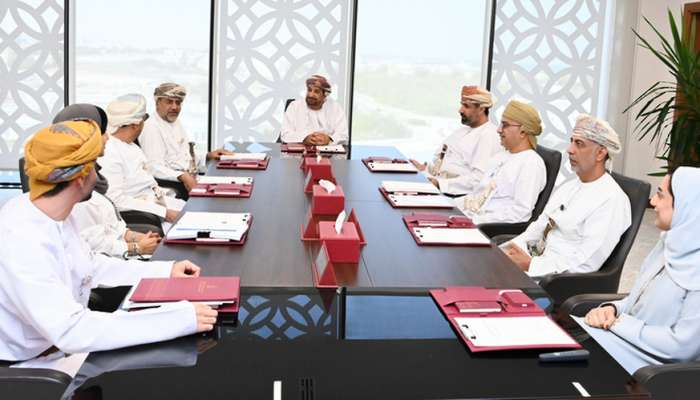
Muscat: The Board of Trustees of the Royal Academy of Management (RAM) on Monday held its fourth meeting under the chairmanship of Sayyid Khalid Hilal Al Busaidi, Minister of the Diwan of Royal Court and Chairman of the Board of Trustees.
At the outset of the meeting, Sayyid Khalid commended the efforts of the working teams and those overseeing the implementation of RAM programmes, initiatives and studies.
Sayyid Khalid reaffirmed that since its establishment, the Royal Academy of Management has been solidifying its position as a pioneering model in enhancing administrative and leadership performance.
He said that the RAM draws inspiration from the vision of His Majesty Sultan Haitham bin Tarik, who places great importance on investing in national competencies.
Sayyid Khalid said that through its local and global partnerships with renowned educational institutions, as well as its innovation-driven programmes, initiatives, and studies, the RAM seeks to equip national leaders with contemporary knowledge and skills to enhance their future readiness and contribute to the objectives laid out in Oman Vision 2040.
The meeting addressed the RAM’s strategic direction since its establishment (in 2022), affirming its role as a hub for executive learning and developing national leaders and a platform for thought and impactful leadership, administrative development, and knowledge foresight.
The RAM aims to contribute to Oman’s socio-economic development and progress by facilitating a work environment that promotes a culture of efficiency, productivity, and civil service excellence across state administrative institutions.
To empower national leaders and maximise their impact across various sectors, which is in alignment with the Oman Vision 2040 objectives, the RAM has expanded its strategic role by creating an impactful executive education ecosystem that includes and serves growth leadership communities in Oman.
During their meeting, the Board also reviewed the achievements of the RAM in 2024, highlighting its integrated approach to developing influential and impactful leadership communities while embedding a mindset aligned with the national identity and values. Key accomplishments in 2024 included structured programmes, studies, and dialogues designed to enrich national competencies through a systematic learning philosophy based on localised global best practices.
Studies, among others, included an analysis of the role of technology in government transformation and an assessment of public–private sector partnerships.
With over 1,209 alumni to date, the Royal Academy of Management has had an impact on various professionals across diverse leadership levels.
The RAM has prioritised building an executive ecosystem of leadership communities of alumni networks by facilitating engagement, collaboration, and peer learning. The RAM has also established discussion forums and offers dialogue sessions to ensure continuous knowledge exchange while incorporating feedback and insights shared by leadership communities into its development plans.
The Board commended the Royal Academy of Management’s pioneering role in advancing GCC collaboration, which aligns with Oman’s visionary approach to developing qualified professionals and investing in human capital development.
This pioneering role has been exemplified through the implementation of the ‘Future of Work in Government programme for GCC Countries,’ which involved 65 participants, including ten from each of the six GCC member states and five from the GCC General Secretariat. The programme was acknowledged as a resounding success in achieving its objectives.
The RAM has also made significant strides in enhancing national leadership capabilities across the public, private sectors and the society at large, reinforcing its essential role as a key player in improving administrative performance through local, regional and international partnerships.
Furthermore, the media outreach of the RAM has expanded beyond local coverage to include regional and international platforms. In support of the development of localised content, the RAM has collaborated with 132 small and medium-sized enterprises (SMEs) from 12 different sectors.
The Meeting of the Board also discussed the strategic directions of the Royal Academy of Management for the period 2025–2030, which focus on the following three main objectives: Building a sustainable and local ecosystem that includes small and emerging learning and development enterprises in Oman and connects them with international partners to exchange knowledge and expertise.
The second main objective is achieving zero-distance; this means eliminating barriers among RAM’s stakeholders by working across diverse leadership communities, facilitating teamwork and collaboration to align efforts and ensure a comprehensive approach to leadership development in Oman.
The third main goal is developing innovative solutions, initiatives, and practices adapted and tailored to the local context and requirements while promoting a culture of experimentation and innovation that meets both national requirements and aligns with global trends.
The RAM also emphasises Government-Entrepreneurship, known as the ‘Gov-preneurship’ concept, integrating content, context and leadership development to equip future leaders with the skills required to lay the groundwork for Oman’s future growth.
During the meeting, the Board approved the 2025 Annual Plan of the Royal Academy of Management, which includes a set of initiatives, projects, and studies aligned with an integrated timeline, leveraging innovative programmes and strategic international partnerships with prestigious institutions.
The Board of Trustees of the Royal Academy of Management is chaired by Sayyid Khalid Hilal Al Busaidi, Minister of the Diwan of Royal Court, and includes the following board members: Dr. Said Mohammed Al Saqri, Minister of Economy, Dr. Mahad Said Ba’owain, Minister of Labour, Sheikh Waleed Khamis Al Hashar, Chief Executive Officer of Bank Muscat, Khawla Hamoud Al Harthy, Chief Executive Officer of Injaz Oman and Dr Hatim Bakhit Al Shanfari, Faculty Member at the College of Economics and Political Science, Sultan Qaboos University.